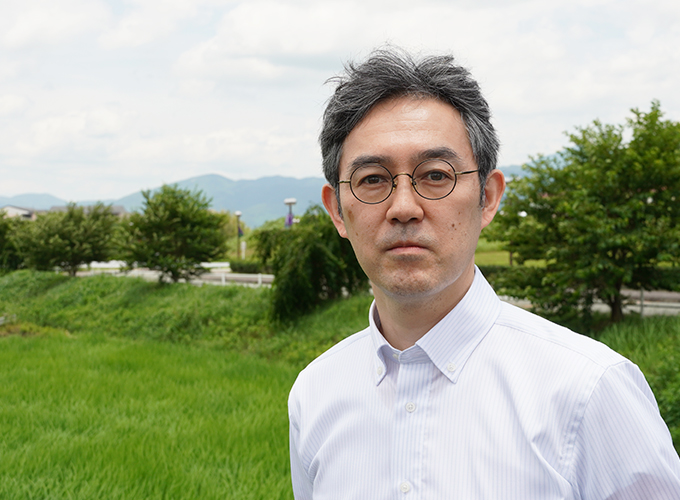Jun Hoseki
Professor, Ph.D. in Science
- hoseki.jun

- Areas of Research
- Cell Biology, Molecular Biology, Biochemistry, Protein Engineering
- Profile
- Research
-
Dr. Jun Hoseki grew up in Nishinomiya City, Hyogo Prefecture and completed his undergraduate and graduate studies at Kyoto University. During his university days, he was a member of the choir, and even now, he still enjoys singing.
After graduating from Kyoto University, he worked as a researcher for a private company for a year and then returned to academia and earned his Ph.D. from Osaka University.
Prior to joining KUAS, Dr. Hoeski worked at several universities and a research institute, with a majority of that time being spent working and researching at Kyoto University.
He has been residing in Kyoto City for almost 20 years now. His current hobbies include watching professional baseball games and photography. Recently, he has been walking as much as possible to maintain his health.The major subjects that Dr. Hoseki instructs are Biochemistry and Genetic Engineering. In Biochemistry, students learn about the chemical structure and function of biomolecules, as well as the mechanisms and regulation of energy generation within cells and how biomolecules are synthesized using that energy. In Genetic Engineering, students learn a range of basic techniques, including PCR, methods for amplifying specific DNA, and genome editing, along with their practical applications.
-
Proteins are often thought of as simply a nutrient, but they actually play a crucial role in cells. In fact, proteins are the key players in most of the activities essential for survival that take place in cells. Did you know that even a single cell can contain tens of thousands of different types of proteins, each with its own unique job?
Proteins are created in cells based on one’s genetic information and folded into a particular shape to perform their specific jobs. However, over time, proteins can become damaged and break down into amino acids, which can then be recycled to create new proteins. Sometimes proteins even become misfolded, which can cause other proteins to do the same. To prevent this from happening, cells have a system in place to control protein quality.
Unfortunately, certain lifestyle habits can cause cellular stress, which can lead to the buildup of misfolded proteins. Additionally, as one ages, their ability to break down and get rid of these abnormal proteins decreases. This can result in the accumulation of damaged proteins in one’s cells, which can ultimately lead to cell death. In fact, cell death has been linked to the development of various diseases, such as Alzheimer’s disease, diabetes, and cancer.
Dr. Hoseki’s laboratory focuses on analyzing proteins that are involved in protein quality control in cells to understand the mechanisms that lead to various abnormalities in cells as a result of aging and lifestyle factors. As birth rates decline and populations continue to age in developed countries, age-related diseases such as diabetes and dementia are becoming more prevalent. Dr. Hoseki’s research efforts are aimed at developing preventive strategies, healthy foods to prevent these diseases, and therapeutic drugs to treat these diseases and increase healthy life expectancy. His laboratory is also interested in improving the production of useful proteins such as hormones, enzymes, and drugs, based on their understanding of the cellular protein quality control system.
Dr. Hoseki welcomes anyone interested to join his laboratory in their research endeavors!
